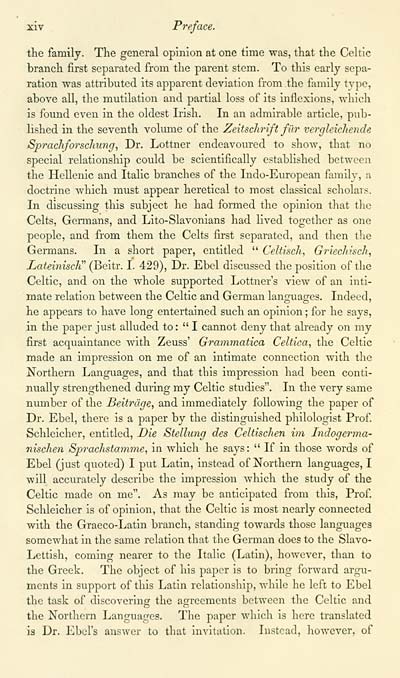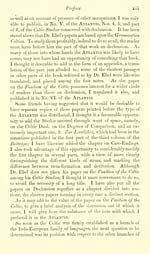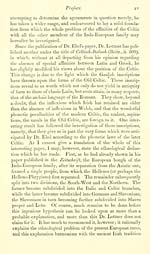Blair Collection > Celtic studies
(18)
Download files
Complete book:
Individual page:
Thumbnail gallery: Grid view | List view

xiv Preface.
the family. The general opinion at one time was, that the Celtic
branch first separated from the parent stem. To this early sepa-
ration was attributed its apparent deviation from the family type,
above all, the mutilation and partial loss of its inflexions, which
is foimd even in the oldest Irish. In an admirable article, pub-
lished in the seventh volume of the Zeitsclirift fur vergleichende
SprachforscJnoig, Dr. Lottner endeavoured to show, that no
special relationship could be scientifically established between
the Hellenic and Italic branches of the Indo-European family, a
doctrine which must appear heretical to most classical scholars.
In discussing this subject he had formed the opinion that the
Celts, Gennans, and Li to- Slavonians had lived together as one
people, and from them the Celts first separated, and then the
Germans. In a short paper, entitled " Celtisch, Griechisch,
Lateinisch" (Beitr. I. 429), Dr. Ebel discussed the position of tlie
Celtic, and on the whole supported Lottner s view of an inti-
mate relation between the Celtic and German languages. Indeed,
he appears to have long entertained such an opinion ; for he says,
in the paper just alluded to: "I cannot deny that already on my
first acquaintance with Zeuss' Grammatica Celtica, the Celtic
made an impression on me of an intimate connection with the
Northern Languages, and that this impression had been conti-
nually strengthened during my Celtic studies". In the very same
number of the Beitrdge, and immediately following the paper of
Dr. Ebel, there is a paper by the distinguished philologist Prof
Schleicher, entitled. Die Stellung des Celtischen im Indogerma-
nischen Sprachstamme, in which he says: " If in those words of
Ebel (just quoted) I put Latin, instead of Northern languages, I
will accurately describe the impression which the study of the
Celtic made on me". As may be anticipated from this. Prof
Schleicher is of opinion, that the Celtic is most nearly connected
with the Graeco-Latin branch, standing towards those languages
somewhat in the same relation that the German does to the Slavo-
Lettish, coming nearer to the Italic (Latin), however, than to
the Greek. The object of his paper is to bring forward argu-
ments in support of this Latin relationship, while he left to Ebel
the task of discovering the agreements between the Celtic and
the Northern Languages. The paper which is here translated
is Dr. Ebcl's answer to that invitation. Instead, however, of
the family. The general opinion at one time was, that the Celtic
branch first separated from the parent stem. To this early sepa-
ration was attributed its apparent deviation from the family type,
above all, the mutilation and partial loss of its inflexions, which
is foimd even in the oldest Irish. In an admirable article, pub-
lished in the seventh volume of the Zeitsclirift fur vergleichende
SprachforscJnoig, Dr. Lottner endeavoured to show, that no
special relationship could be scientifically established between
the Hellenic and Italic branches of the Indo-European family, a
doctrine which must appear heretical to most classical scholars.
In discussing this subject he had formed the opinion that the
Celts, Gennans, and Li to- Slavonians had lived together as one
people, and from them the Celts first separated, and then the
Germans. In a short paper, entitled " Celtisch, Griechisch,
Lateinisch" (Beitr. I. 429), Dr. Ebel discussed the position of tlie
Celtic, and on the whole supported Lottner s view of an inti-
mate relation between the Celtic and German languages. Indeed,
he appears to have long entertained such an opinion ; for he says,
in the paper just alluded to: "I cannot deny that already on my
first acquaintance with Zeuss' Grammatica Celtica, the Celtic
made an impression on me of an intimate connection with the
Northern Languages, and that this impression had been conti-
nually strengthened during my Celtic studies". In the very same
number of the Beitrdge, and immediately following the paper of
Dr. Ebel, there is a paper by the distinguished philologist Prof
Schleicher, entitled. Die Stellung des Celtischen im Indogerma-
nischen Sprachstamme, in which he says: " If in those words of
Ebel (just quoted) I put Latin, instead of Northern languages, I
will accurately describe the impression which the study of the
Celtic made on me". As may be anticipated from this. Prof
Schleicher is of opinion, that the Celtic is most nearly connected
with the Graeco-Latin branch, standing towards those languages
somewhat in the same relation that the German does to the Slavo-
Lettish, coming nearer to the Italic (Latin), however, than to
the Greek. The object of his paper is to bring forward argu-
ments in support of this Latin relationship, while he left to Ebel
the task of discovering the agreements between the Celtic and
the Northern Languages. The paper which is here translated
is Dr. Ebcl's answer to that invitation. Instead, however, of
Set display mode to: Large image | Transcription
Images and transcriptions on this page, including medium image downloads, may be used under the Creative Commons Attribution 4.0 International Licence unless otherwise stated. ![]()
| Early Gaelic Book Collections > Blair Collection > Celtic studies > (18) |
|---|
| Permanent URL | https://digital.nls.uk/75771380 |
|---|
| Description | A selection of books from a collection of more than 500 titles, mostly on religious and literary topics. Also includes some material dealing with other Celtic languages and societies. Collection created towards the end of the 19th century by Lady Evelyn Stewart Murray. |
|---|
| Description | Selected items from five 'Special and Named Printed Collections'. Includes books in Gaelic and other Celtic languages, works about the Gaels, their languages, literature, culture and history. |
|---|

